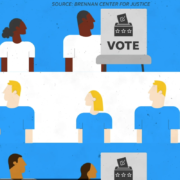Nigerian animator Ridwan Moshood was so determined to learn how to make cartoons, he spent hours in internet cafés in Lagos, watching YouTube lessons and taking notes.
— JOEL SHANNON, SARAH NELSON & ALESSANDRO MARAZZI SASSOON, USA TODAY
Law enforcement and election officials are investigating threatening emails sent to voters in multiple Florida counties pressuring them to vote for President Donald Trump and claiming to be from a far-right group with a history of violent confrontations.
The emails, which appeared to be sent from “info@officialproudboys.com,” said the group had obtained contact information about the voter and threatened to “come after” the person if they don’t vote for Trump
The Proud Boys, a group that catapulted to national attention in September when Trump dodged a chance to condemn them, denied responsibility and condemned the emails.
— Credits
Featured Image, Civil rights experts point to long wait times to vote as a sign of growing voter suppression in the U.S. Here’s what to expect in the 2020 election. Just the FAQs, USA TODAY. Brennan Center for Justice
Full article @ USA TODAY
— Related
The Civil Rights Act of 1964 (Pub.L. 88–352, 78 Stat. 241, enacted July 2, 1964) is a landmark civil rights and labor law in the United States that outlaws discrimination based on race, color, religion, sex, national origin, and later sexual orientation. It prohibits unequal application of voter registration requirements, racial segregation in schools and public accommodations, and employment discrimination.
Initially, powers given to enforce the act were weak, but these were supplemented during later years. Congress asserted its authority to legislate under several different parts of the United States Constitution, principally its power to regulate interstate commerce under Article One (section 8), its duty to guarantee all citizens equal protection of the laws under the Fourteenth Amendment, and its duty to protect voting rights under the Fifteenth Amendment.
The legislation had been proposed by President John F. Kennedy in June 1963, but it was opposed by filibuster in the Senate. After Kennedy was assassinated on November 22, 1963, President Lyndon B. Johnson pushed the bill forward. The United States House of Representatives passed the bill on February 10, 1964, and after a 54-day filibuster, it passed the United States Senate on June 19, 1964. The final vote was 290–130 in the House of Representatives and 73–27 in the Senate. After the House agreed to a subsequent Senate amendment, the Civil Rights Act was signed into law by President Johnson at the White House on July 2, 1964.
Source – Civil Rights Act of 1964 (Updated: 21 October 2020) Wikipedia. Available at https://en.wikipedia.org/wiki/Civil_Rights_Act_of_1964, (Accessed: 21 October 2020)

